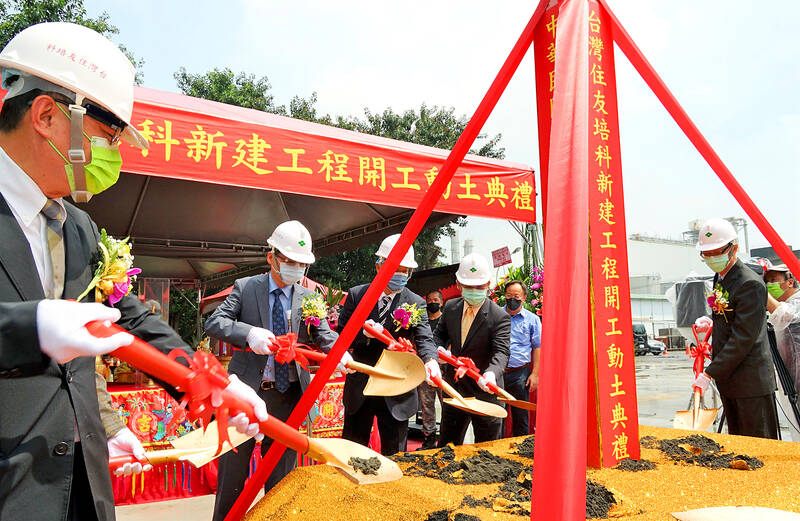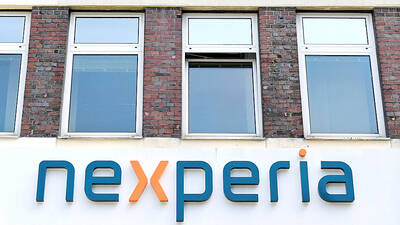Sumitomo Bakelite (Taiwan) Co Ltd (台灣住友培科) yesterday broke ground on a new plant in Kaohsiung’s Dafa Industrial Park (大發工業區) to expand production capacity for semiconductor packaging materials.
The company expects the NT$800 million (US$26.05 million) investment to double its production capacity in Taiwan, the Kaohsiung Economic Development Bureau said in a statement.
The company is expected to complete construction of the plant next year, increasing its monthly capacity in Taiwan from 700 tonnes to 1,400 tonnes, the company said.

Photo copied by Ge You-hao, Taipei Times
Sumitomo Bakelite (Taiwan) is a joint venture between Japan’s Sumitomo Bakelite Co Ltd and Taiwan’s Chang Chun Plastics Co Ltd (長春樹脂).
It was founded in 1999, with Sumitomo Bakelite providing 70 percent and Chang Chun Plastics 30 percent of the financing, to produce epoxy molding compounds for semiconductor encapsulation in the region.
Sumitomo Bakelite ranks first in the world in semiconductor packaging materials, with a 40 percent share of the global epoxy molding compounds market, Kaohsiung Economic Development Bureau Director-General Liao Tai-hsiang (廖泰翔) said.
The investment in Kaohsiung reflects the company’s optimism about the long-term outlook for the semiconductor market, Sumitomo Bakelite president Kazuhiko Fujiwara said.
Kaohsiung City Government Deputy Secretary-General Wang Chi-chuan (王啟川), Chang Chun Plastics president Chen Hou-fu (陳厚福) and Chang Wah Electromaterials Inc (長華電材) chairman Canon Huang (黃嘉能) attended the groundbreaking ceremony, along with other business representatives.
Wang praised Sumitomo Bakelite’s presence in the city over the past 24 years, saying that he expected the new investment to drive an industrial transformation in Kaohsiung — from petrochemicals to semiconductors — and bring more employment opportunities.
Companies including Taiwan Semiconductor Manufacturing Co (台積電), Win Semiconductors Corp (穩懋半導體), Winbond Electronics Corp (華邦電子) and Merck Group have over the past two years invested in Kaohsiung, helping establish a semiconductor corridor in the city, he said.

Jensen Huang (黃仁勳), founder and CEO of US-based artificial intelligence chip designer Nvidia Corp and Taiwan Semiconductor Manufacturing Co (TSMC, 台積電) on Friday celebrated the first Nvidia Blackwell wafer produced on US soil. Huang visited TSMC’s advanced wafer fab in the US state of Arizona and joined the Taiwanese chipmaker’s executives to witness the efforts to “build the infrastructure that powers the world’s AI factories, right here in America,” Nvidia said in a statement. At the event, Huang joined Y.L. Wang (王英郎), vice president of operations at TSMC, in signing their names on the Blackwell wafer to

AI BOOST: Although Taiwan’s reliance on Chinese rare earth elements is limited, it could face indirect impacts from supply issues and price volatility, an economist said DBS Bank Ltd (星展銀行) has sharply raised its forecast for Taiwan’s economic growth this year to 5.6 percent, citing stronger-than-expected exports and investment linked to artificial intelligence (AI), as it said that the current momentum could peak soon. The acceleration of the global AI race has fueled a surge in Taiwan’s AI-related capital spending and exports of information and communications technology (ICT) products, which have been key drivers of growth this year. “We have revised our GDP forecast for Taiwan upward to 5.6 percent from 4 percent, an upgrade that mainly reflects stronger-than-expected AI-related exports and investment in the third

RARE EARTHS: The call between the US Treasury Secretary and his Chinese counterpart came as Washington sought to rally G7 partners in response to China’s export controls China and the US on Saturday agreed to conduct another round of trade negotiations in the coming week, as the world’s two biggest economies seek to avoid another damaging tit-for-tat tariff battle. Beijing last week announced sweeping controls on the critical rare earths industry, prompting US President Donald Trump to threaten 100 percent tariffs on imports from China in retaliation. Trump had also threatened to cancel his expected meeting with Chinese President Xi Jinping (習近平) in South Korea later this month on the sidelines of the APEC summit. In the latest indication of efforts to resolve their dispute, Chinese state media reported that

CHINESE EXPORT CURBS: A dispute between China and the Netherlands could halt chip supply, affecting vehicle production, US and European auto associations said Groups representing major automakers late on Thursday warned that a chip disruption stemming from a dispute between China and the Dutch government could quickly affect US auto production. Automakers and their suppliers received notice from chipmaker Nexperia (安世半導體) last week that it could no longer guarantee delivery of its chips, the European Automobile Manufacturers Association said, adding that manufacturing could be significantly disrupted. In the US, the Alliance for Automotive Innovation, which represents General Motors, Toyota, Ford, Volkswagen, Hyundai and nearly all other major automakers, urged a quick resolution. “If the shipment of automotive chips doesn’t resume — quickly — it’s going to